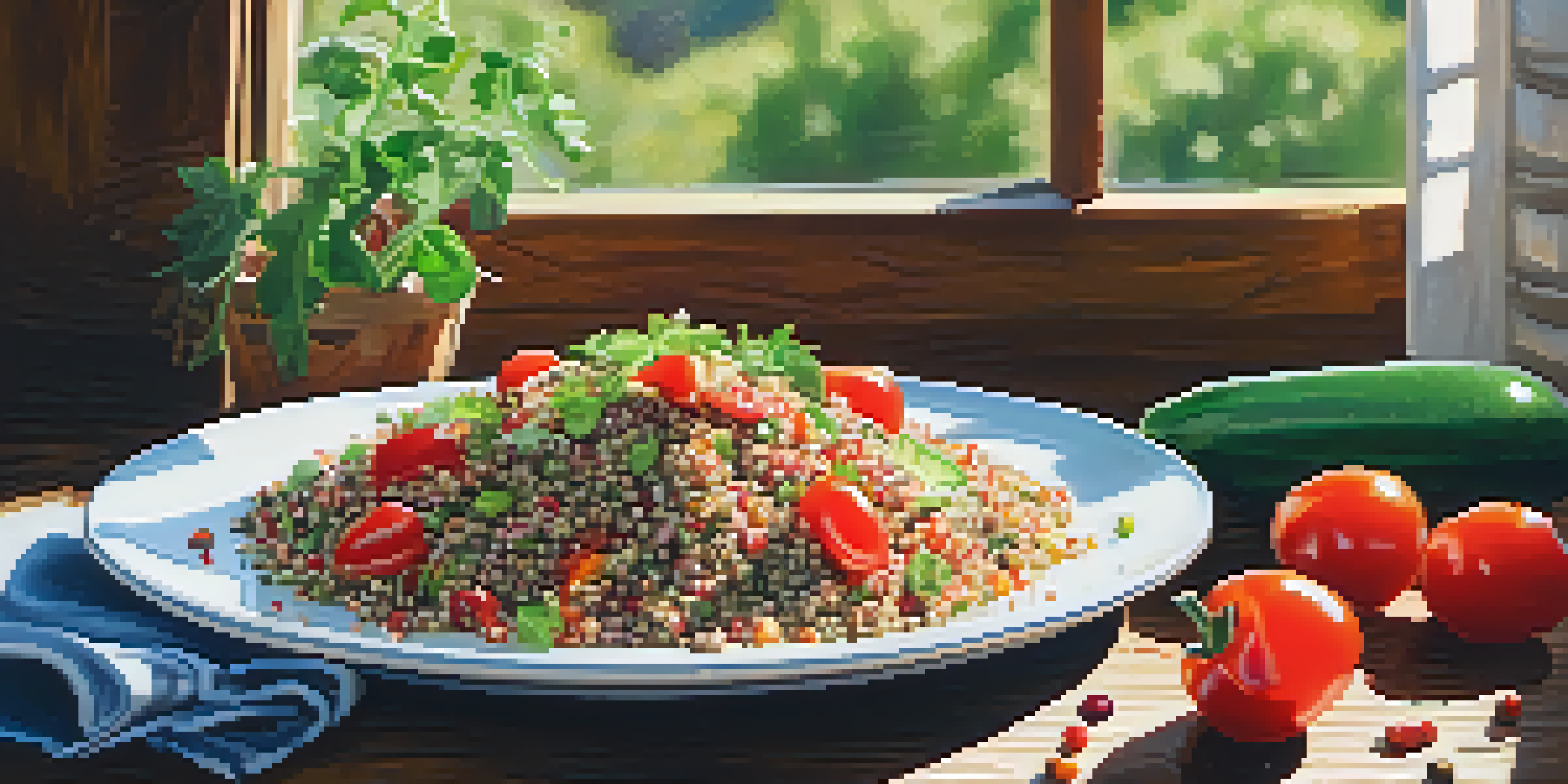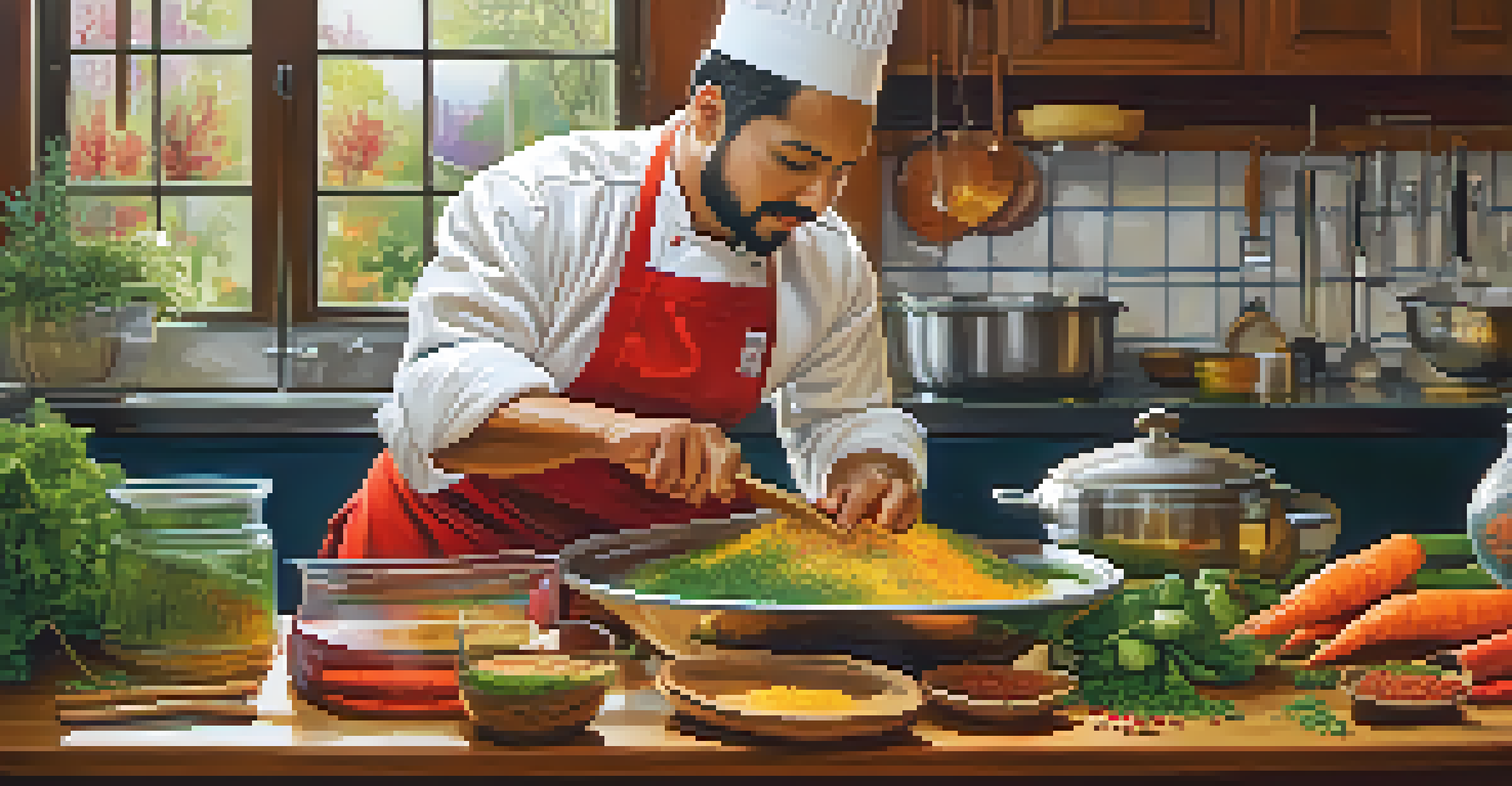Essential Tips for Cooking Vegan Food for Special Diets

Understanding Veganism and Special Diets
Veganism is more than just a diet; it's a lifestyle choice that excludes all animal products. Understanding this foundation is crucial when catering to special diets, such as gluten-free or low-carb. Each diet has its unique restrictions and requirements, which can make vegan cooking a bit tricky but also incredibly rewarding.
The food you eat can be either the safest and most powerful form of medicine or the slowest form of poison.
For instance, if you're cooking for someone who is gluten-free, you’ll need to avoid wheat-based products while still ensuring the meal is hearty and satisfying. Similarly, those on a low-carb diet will be looking for alternatives to grains and starchy vegetables. Recognizing these nuances helps you create meals that are both delicious and compliant with dietary needs.
By understanding the core principles of both veganism and the specific dietary restrictions, you'll be well-equipped to create meals that cater to everyone at the table, making your culinary journey more inclusive and enjoyable.
Essential Ingredients for Vegan Cooking
Stocking your pantry with essential vegan ingredients is foundational for any successful cooking endeavor. Items like beans, lentils, quinoa, and a variety of fruits and vegetables provide a rich base for countless recipes. These ingredients are not only versatile but also packed with nutrients that support a healthy lifestyle.

Don't forget about important vegan substitutes for dairy and meat, such as almond milk, nutritional yeast, and tofu. These alternatives can make it easier to recreate traditional dishes while maintaining the integrity of a vegan diet. Plus, they can add unique flavors and textures to your meals.
Veganism: A Lifestyle Choice
Veganism extends beyond diet, requiring understanding of both vegan principles and specific dietary restrictions to create inclusive meals.
Having a well-stocked pantry gives you the freedom to experiment and adapt recipes based on the specific dietary needs of your guests. This way, you can confidently whip up a meal that everyone will enjoy, regardless of their dietary restrictions.
Creative Swaps for Common Ingredients
When cooking vegan meals for special diets, creative ingredient swaps can be a game changer. For example, if you’re preparing a dish that typically uses eggs, consider using flaxseed meal mixed with water as a binding agent instead. This not only keeps the dish vegan but also adds a nutritious twist.
You don't have to be vegan to enjoy vegan food, but you have to be open-minded.
Similarly, if a recipe calls for dairy, you can easily substitute with plant-based alternatives. For instance, cashew cream can be a rich and creamy replacement for heavy cream, making your sauces and soups just as indulgent. It’s all about finding those right swaps that maintain the flavor and texture of your dishes.
Experimenting with these substitutions not only broadens your cooking skills but also allows you to cater to various dietary preferences. By being inventive, you can transform traditional recipes into vegan delights that everyone can savor.
Nutritional Considerations in Vegan Cooking
Nutritional balance is vital when cooking vegan meals, especially for those with special diets. It's important to ensure that your dishes include a variety of nutrients, including protein, iron, calcium, and omega-3 fatty acids, which can sometimes be lacking in a vegan diet. Incorporating foods like leafy greens, nuts, and seeds can help fill these gaps.
For those on gluten-free diets, be mindful of cross-contamination and ensure that your ingredients are certified gluten-free. Additionally, be aware of the need for vitamin B12, which is primarily found in animal products. Vegans might need to consider fortified foods or supplements to avoid deficiencies.
Essential Vegan Pantry Staples
Stocking your pantry with versatile vegan ingredients like beans, lentils, and plant-based substitutes is crucial for successful cooking.
By paying attention to these nutritional aspects, you can create meals that not only taste great but also nourish the body. This is particularly important for individuals with special dietary needs, as they may already be more vulnerable to nutritional deficiencies.
Flavoring Your Vegan Dishes Right
Flavor is key in any cooking, and vegan food is no exception. To elevate your dishes, focus on using fresh herbs, spices, and condiments that bring out the natural flavors of your ingredients. Ingredients like garlic, ginger, and citrus can add a burst of freshness that makes a dish come alive.
Don’t shy away from experimenting with different flavor profiles. For example, consider adding a dash of smoked paprika for a smoky flavor or nutritional yeast for a cheesy taste. These small additions can make a significant difference, especially when cooking for those who may be skeptical of vegan cuisine.
Ultimately, the goal is to create meals that are not only healthy but also bursting with flavor. This approach makes it easier to impress your guests, regardless of their dietary preferences, and showcases the versatility of vegan cooking.
Meal Planning for Special Diets
Meal planning is an essential strategy when catering to vegan diets with special restrictions. By planning ahead, you can ensure that you have all the necessary ingredients on hand and avoid last-minute scrambles. This is especially useful for busy schedules or for those who are unfamiliar with vegan cooking.
Start by creating a weekly menu that incorporates a variety of flavors and nutrients. This not only keeps meals exciting but also prevents the dreaded boredom that can come from repeated meals. It’s also a good idea to batch cook staples like grains and legumes, which can be easily incorporated into different dishes throughout the week.
Meal Planning for Dietary Needs
Effective meal planning helps ensure you have the right ingredients and can cater to various dietary restrictions, making mealtime enjoyable.
With thoughtful meal planning, you can create a harmonious balance of dishes that cater to everyone’s dietary needs, making mealtime a stress-free and enjoyable experience for all.
Cooking Techniques that Enhance Vegan Meals
The way you prepare your food can significantly impact the final dish, especially in vegan cooking. Techniques like roasting vegetables can intensify their flavors and create a delicious caramelization that makes them irresistible. Similarly, grilling can add a smoky flavor that elevates simple ingredients.
Don’t underestimate the power of marinating. By allowing your tofu or tempeh to soak in flavorful marinades, you can infuse them with taste, making them star ingredients in your dishes. This technique is particularly effective for those who may be new to vegan food, as it can help bridge the gap between familiar flavors and new experiences.

By honing in on these cooking techniques, you can transform simple vegan ingredients into gourmet meals that impress even the most skeptical eaters. This approach not only enhances the meal but also showcases the versatility and creativity of vegan cooking.